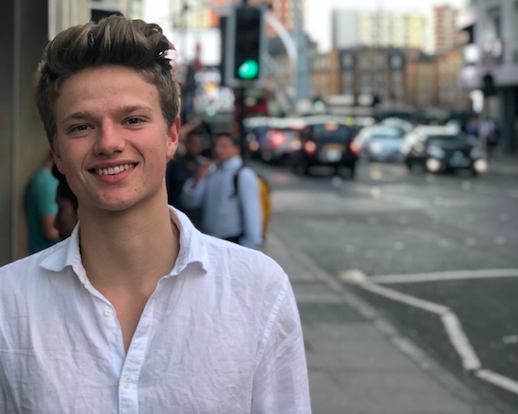
Reynolds is a recently graduated Auckland student who provoked an online discussion about what needs to change in New Zealand’s education system earlier this year. His opinion piece, which was published on Education Central and titled ‘One student’s open letter to educators: please prepare us better for the real world’ detailed why more students need to be introduced to technologies that are drastically altering the world as we know it, such as blockchain, AR/VR and AI.
“There’s so many exciting technologies that are going to change our world, and potentially change the next 30 years more than the last 200,” Reynolds tells Idealog. “Nanotechnology, VR, AR, robotics, drones, AI, self-driving cars. Anti-aging is a serious thing, there’s a good chance you and I are going to live to 110 or 120. We could be in a flying car in a few years – in Hong Kong they’re trialing flying cars next year. There’s a good chance some humans will be on Mars in the next 30 years. We’re shown none of it [in school] – just the traditional pathways and that’s it.”
Though Reynolds is equipped with a deeper understanding of these new technologies than most of his peers, he says the path he followed to get to this point was not the norm. At the ripe age of 18, he has already interned at investment companies, tried his hand at start-ups, and won a trip to San Francisco with five other Young Enterprise students. As well as this, when he wrapped up his time at Saint Kentigern College last year, he headed straight over to Silicon Valley to shadow the CEO at Swyft, a retail automation company, and followed this up by interning at Auckland-based payments company Genovapay over the summer.
Reynolds says his passion for the sector was kickstarted when he was 14 and read a book about investing. He started doing his own schooling in his spare time in areas like finance, investing and psychology, and ended up stumbling into the start-up scene through Icehouse events and online content from Singularity University.
He’d occasionally spot an article in the NZHerald about new technologies, he says, but at school, he didn’t hear anything about the likes of nano-techology, blockchain or AR and VR – something he considers a crucial gap in the education system. He says what interests him the most about the tech sector is the ability to create huge change and get scale and speed and impact with the rapidly developing new technologies.
And while Reynolds hasn’t actually done anything yet, his motivation to make something of himself in the tech sector sets him apart from the crowd. He has had people tell him he’s “lucky” for the opportunities he’s received, but says it’s just a result of the effort he’s put in to carving out this pathway for himself.
“It’s a shame because I’m not special,” he says. “Everyone can go out and do this, and if they had been exposed to it in the same way there could be another 50 people from my school on entrepreneurial paths, or going out and working in the tech sector. It’s just nuts how disparate it is and how hard it is to find people my age exposed to these industries.”
He says changes to the curriculum don’t necessarily have to focus on encouraging students into the tech sector, as everyone has different passions, but they need to be shown the impacts of new technology and how it is shaking up different industries across the board.
For example, he says those that are going into the medical profession need to know the effects of AI and how it will hold stores of information, rather than students needing to memorise many textbooks.
“There are also ethical questions about AI, and they don’t have a voice in that because a lot of them don’t know it exists because they haven’t been exposed to it,” he says.
“My argument is give students couple of hours education on these technologies, so when they go to university, they’re aware of it. It’s not a call for them to become an entrepreneur, it’s a call to show us the technologies which are going to shape all of our lives. Everyone need to know how their futures might change.”
As for Reynolds’ future, instead of taking the usual step of going to University after high school, he’s decided to spread his time working in tech companies across several different countries to get on-the-ground experience.
He’s ticked off shadowing a CEO in Silicon Valley, is doing the same in London currently, and plans on heading to Asia next.
“I think I could learn more by myself, so I’m going to go shadow and learn from some of the world’s best leaders. Not just people skills, but operational skills – like building a company at a world class level,” he explains.
“I want get deeper into the technologies that are going to change the future, like blockchain, not just the hype everyone hears about.”
For now, says he’s focused on learning and soaking up the information like a sponge.
“That’s partially what’s scary about my future – university might play a role, but I’m not sure what. This year is about finding what opportunity in tech excites me most, or that I want to go and solve. All I know is that I’m a problem solver, and I want to start a company around that.”
Watch this space.




